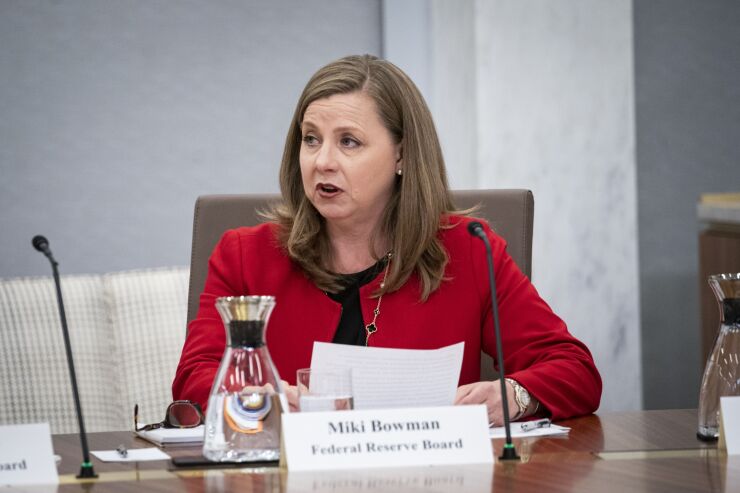
Federal bank regulators are considering regulatory and supervisory changes to address the yearslong uptick in check fraud and other illicit payments activities.
The Federal Reserve, Federal Deposit Insurance Corp. and Office of the Comptroller of the Currency issued a joint request for information on Monday afternoon aimed at soliciting public input on a broad range of topics, including avenues for better government collaboration to prevent fraud, educational opportunities and even potential changes to requirements under the Electric Funds Availability, or EFA, Act. Requests for information are often the first step agencies will take when developing or revising a regulation.
In a written statement issued alongside the notice, Fed Vice Chair for Supervision Michelle Bowman — who was
"Check fraud has grown substantially over the past several years, resulting in harm to banks, especially community banks, and the consumers and businesses who are the victims of fraud," she said. "While this has been a well-known problem for several years, efforts by regulators have been slow to advance, and seem to have done little to address this growing threat."
The request for information pledges no specific rule changes, though Regulation CC — the Fed's implementation of the EFA Act — is mentioned several times as an area for potential policy adjustment. Passed in 1987 and implemented the following year, the law requires banks to settle customer transactions swiftly, albeit with six exceptions, including suspicion of fraud.
The agencies have asked for input about how potential changes to their policies on deposit holds might help banks better address instances of fraud. They also inquire whether technological advancements might make it appropriate for mandatory hold periods to be shortened.
Other lines of questioning include interbank disputes over fraudulent transactions — namely, which institution is responsible for making the harmed customer whole. The agencies are seeking feedback about common areas of conflict and what they can do to ease these tensions or provide better guidance on avoiding them.
Regulators are also exploring changes around collecting and sharing information about instances of fraud, noting that instances of fraud might actually be underreported because some consumers are unaware that they've been victimized or are too embarrassed to disclose their losses. The request for information asks what might be done to reduce confusion and the stigma around fraud.
The Fed has also asked what its regional reserve banks, which are tasked with operating the central bank's payment systems, might be able to do to better screen for fraud.
"We need a comprehensive strategy to develop and implement an effective, coordinated approach that is focused on preventing payments fraud and assisting consumers, businesses, and supervised institutions," Bowman said. "As Vice Chair for Supervision, I am committed to working together with a wide range of state and federal partners, including law enforcement, to address this issue. I look forward to reviewing the public feedback in response to the request for information."






